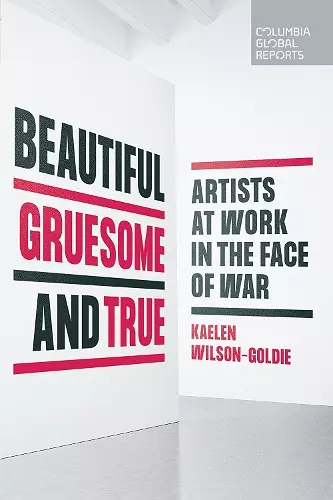Beautiful, Gruesome, and True
Artists at Work in the Face of War
Format:Paperback
Publisher:Columbia Global Reports
Published:20th Oct '22
Should be back in stock very soon

Why have some of the most interesting artists of our time committed themselves to some of the most devastating conflicts on Earth?
Why are some of the most interesting artists of our time committed to engaging with conflict and exploitation around the world? Beautiful, Gruesome, and True tells the stories of three of them: Amar Kanwar makes riveting films about the destruction of rural India in the drive to extract natural resources. Teresa Margolles creates haunting installations from the traces of crime scenes and drug-related violence in Mexico. The anonymous collective Abounaddara has produced more than four hundred short films chronicling the uprising and civil war in Syria. Drawing on years of research and extensive reporting, Kaelen Wilson-Goldie vividly recounts how a group of “political” artists found ways to produce remarkable works of art that demand deliberate and methodical ways of thinking—works that are contemplative, thoughtful, even redemptive.
Named one of the best art books of the year by Holland Cotter of the New York Times
“A gifted critic and a compelling journalist, Wilson-Goldie offers many important insights into the challenges these artists face in their confrontation with authority, repressive regimes, death, and violence. The story she tells could not be more timely.”
—Glenn D. Lowry, David Rockefeller Director, Museum of Modern Art
Named one of the best art books of the year by Holland Cotter of the New York Times
“Far from solving the world's problems with art, as Wilson-Goldie illustrates in her crystalline analysis of their practices, these artists have impacts in their worlds and ours, and that might just be enough to make a difference.” —Art Asia Pacific
“Wilson-Goldie has chosen to write about artists working in places where governmental institutions have collapsed or capitulated to outside forces, allowing criminality and violence to flourish. In such circumstances, Wilson-Goldie argues, art may operate as a proxy for political discourse that has otherwise been suppressed.” —Art in America
“Wilson-Goldie’s act of paying attention is a practical, sensitive, and proximate way of thinking about what is often represented from a distance. Her writing in this book is a kind of faith—in art, in the importance of the stories it tells, in how we meet through it, and recognize each other.” —art-agenda
“Kaelen Wilson-Goldie writes with clarity and great knowledge about the artists Amar Kanwar, Teresa Margolles, and the Syrian collective Abounaddara. A gifted critic and a compelling journalist, she offers many important insights into their art, and the challenges they each face in their confrontation with authority, repressive regimes, death, and violence. The story she tells is one of persistence and dedication, contingency and tragedy, and the ability of art to transcend the horrors of murder, violence, war and repression. It could not be more timely.” —Glenn D. Lowry, David Rockefeller Director, Museum of Modern Art
“Without cynicism or naïveté, Kaelen Wilson-Goldie finds and engages deeply with artists who maintain unflinching contact with the violence of the present. No one can know whether real social change will ever arrive, but without doubt the art of Kanwar, Margolles, and Abounaddara, as beautifully unfolded in this book, will stand as a passionate, imaginative, and scrupulous history of those who refused to turn away.” —Katy Siegel, Eugene V. and Clare E. Thaw Endowed Chair in Modern American Art, Stony Brook University; and Senior Curator, Baltimore Museum of Art
“Kaelen Wilson-Goldie writes with depth, nuance, and empathy about three artists who have dedicated their lives to grappling with violence, conflict, and war. She shows that it’s both possible and essential to produce politically engaged art that truly matters, without fear or compromise. This book is an important contribution to contemporary debates over journalism, misinformation, and the nature of truth.” —Mohamad Bazzi, director, Hagop Kevorkian Center for Near Eastern Studies, New York University
ISBN: 9781735913728
Dimensions: unknown
Weight: unknown
176 pages